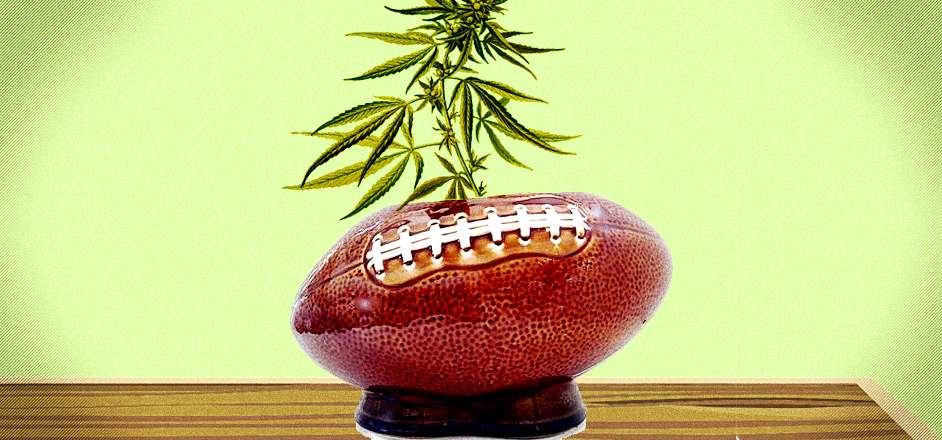This makes former NFL quarterback Jake Plummer really, really happy …
Having a collective net worth of close to $100 billion and the world’s most watched annual platform in the Super Bowl, it’s safe to say people pay attention to what the NFL does. Because of that, it's in a unique position to drive the conversation forward about cannabis and its benefits to players.
But it’s not a very kind organization to the plant, even though many of its players admit to (or have been caught) using it all the same. Many list medical problems as the reason they use, and continue pressing the league to allow it under the right circumstances. That persistence might be working, because if the league takes to heart a proposal that the players’ association is putting forth, there just might be a more accepting cannabis culture on the horizon in football.
In a meeting with The Washington Post, the NFL Player’s Association executive director DeMaurice Smith presented a motion to have the NFL drop penalties for using weed. He wants the league to approach marijuana use in a treatment sense instead of a behavioral sense — because it just makes sense. He adds that those in charge of the policies should stop assuming that players only use weed simply for recreational purposes as well, completely omitting beneficial medical uses that have become so prevalent in professional sports in the face of a changing America.
“I do think that issues of addressing it more in a treatment and less punitive measure is appropriate,” said Smith during the meeting. “I think it’s important to look at whether there are addiction issues. And I think it’s important to not simply assume recreation is the reason it’s being used.”
Former NFL quarterback Jake Plummer sees this as a good thing. Over the phone from his part-time residence in northern Idaho, he says that the move Smith and the association are making is fantastic, considering they’re budging in a way he sees as positive instead of shuttering out the topic altogether.
“It’s encouraging,” he adds. “I feel that DeMaurice Smith has been trying to do his job to make everyone happy. It’s a tough position to be in, but I think this is a great step that he’s taking.”
As a rep for the player’s union, Smith making it a point to bring the consensus out in the open is a gesture Plummer likes. He adds, however, that he wants action out of it and hopes it’s not just a move to keep pressure off until it blows under the bridge.
He’s so interested in the NFL's progress on the matter because he’s one of the few retired players that are heavily involved in pushing forward initiatives to find out whether or not cannabidiol (CBD) can work to treat — or prevent — brain trauma from happening. He says he's ready to get to work on it, just as soon as the NFL gets involved too.
“We’ve got protocols and IREs and everything ready to do research through Johns Hopkins and University of Penn,” says Plummer. “Everything is set up it’s all ready to go. We just need current players to sign up.”
His intention is to get injured players off “white pills that have such awful side effects” and to keep those who do choose to use cannabis (often in the shadows) out of trouble while they’re playing.
But the owners call the shots, and Plummer doesn’t feel like they want anything to do with cannabis right now. But if more and more players come out in defense of it, under a (hopefully) accepted policy in the NFL treating it as a medicine instead of a recreational hobby, owners and the commissioner would be wise to listen and back everyone up.
“If I was the commissioner, I would be very interested to find out (if CBD works) — the helmets, whatever, you can do whatever you want to the helmets — it does not matter, the brain is not protected internally,” he adds. “If you can protect it internally, if hemp oils protect the brain internally, there’s problem solved. Or maybe not problem solved, but the PR is gonna be tremendous for your compassion for your players.”
Already, studies have shown the potential CBD has in protecting a player's brain when going through such trauma. In 2013, researchers at the Tel Aviv University found that administering low doses (1,000 to 10,000 times less potent than one joint) to mice showed it can "jumpstart biochemical processes which protect brain cells and preserve cognitive function over time," per the report.
The reality is, blockades against research are keeping people like Plummer and his anxious team in limbo. He’s hopeful, however, that the new proposal from the NFLPA will do good by what he believes in.
“If this naturally occurring, non-toxic supplement can help protect their brains,” he says, pausing briefly, “you know, I don’t have to say any more than that.”




Leave a Reply
You must be logged in to post a comment.